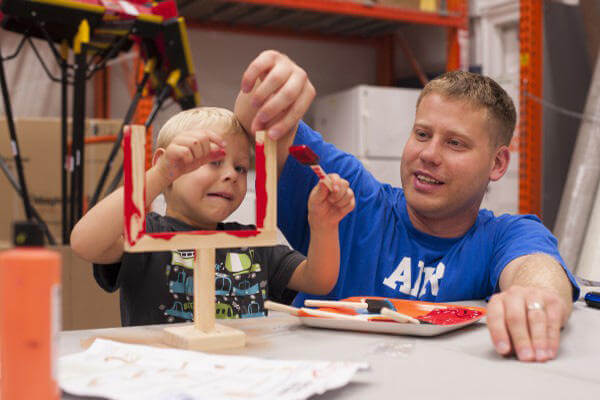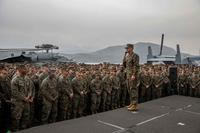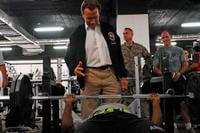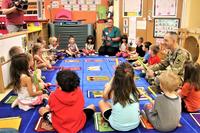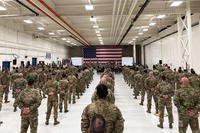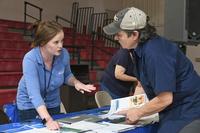Lugging his bags to the curb, contemplating innumerable what ifs, Tech. Sgt. Aaron Drain pauses for a moment and reassures his wife Heather that everything will be all right. Holding back her tears, she whispers softly that she loves him.
As midnight approaches, Drain kisses his wife and their two sons goodbye and leaves for war.
"Saying goodbye is a hard emotion to capture," said Drain, "especially because there is always the chance that it could be your last one. That goodbye hurts for at least a month. The first time I deployed, once Heather was gone, I cried for at least 15 minutes. I hid that emotion from her, I guess to try to be the strong one, but I think it might have hurt more than anything."
Just three weeks prior to his departure, the couple celebrated the arrival of their second child, Everett.
"She just had a baby; she's still healing," said Drain. "If I put myself in her shoes, I'm basically abandoning her. I'm still here financially, but what good is that sometimes?"
Situations like Drain's present a clear illustration of the resiliency that Airmen exhibit every day in service to the nation. Regardless of length or location, the men and women fulfilling these deployment obligations have given up some measure of normalcy to do so.
For Drain, a C-130H Hercules flight engineer with the 53rd Airlift Squadron at Little Rock Air Force Base, Ark., this deployment represents an opportunity to improve on several missteps he made during his first deployment to Iraq.
"The first time I went, I had maybe a month's notice," said Drain. "It was good for my career, but I failed to see where it was good for my family or make it good for my family by discussing it with her. I failed big time. That was one thing I knew I would not let happen this time."
He said lack of communication caused undue stress on his marriage during the deployment.
"One of the biggest things is communication," Drain said. "The first time, in Iraq, we just didn't talk about anything. I went over there, and it all just blew up because we never talked about it. We got it solved, we figured it out, but some couples don't and they never recover. Communication is number one; everything will fall apart otherwise."
Another focal point for Drain was the comfort of his family during his absence.
"During this deployment, my preparations started much earlier," he said. "It really started at the first hint of the possibility of deploying. The first step was talking with Heather. We knew the baby was coming, so making sure she could handle it was important.
"After that, we started looking around the house to see what needed to be fixed or could potentially go bad," Drain said. I wanted her to be happy. The last thing you want on the road is to worry about their comfort."
As dawn approached on the morning of his deployment, Drain sat quietly with a group of Airmen. Crammed into the darkest corners of the base passenger terminal, the fatigue of preparation had set in. Some made small talk, however, most spent their final moments on station in muted meditation. Some had embraced the expedition at hand; while others were adrift, transfixed by familiar reflections.
For Drain it was both.
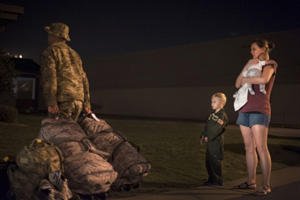
"There are so many things that could go wrong," he said. "All I could think about is how I could have prepared my wife and family better. There comes a point, though, where you have to focus energy on what is in front of you and what you are doing. If you can't or don't shift gears to the task in front of you, you could really get people hurt, or worse."
Back Home
Exhausted from another day of managing tantrums, diapers, laundry, dinner, baths and bedtime, Heather finally sits down. She is at last free to enjoy some quiet time after a long day's work.
The respite lasts all of 10 minutes before Ayden gets up from bed and awakens 6-month-old Everett, who is ready for a feeding. The frustration of even the smallest task or chore amplifies as each day passes. Rest comes in small increments, as most nights she is lucky to get just three hours of sleep.
For Heather, there are no typical days, yet, each one seems like a habitual rerun. In the four months that have passed since she said goodbye to her husband, she has spent nearly every day and night caring for the couple's sons. Through all of the hardships, she insists that her biggest challenges have been neither physical nor mental. Instead her battles are being waged on an emotional front.
"The hardest part of being here, by myself, raising two boys would be not having anyone around to experience the special moments and the things that your kids do, someone to share it with," she said.
Heather also achieved a few milestones of her own. After serving on active duty for eight years as an aerospace medical technician, she transitioned to the Air Force Reserve in November. The move will allow her to become a stabilizing force at home.

"Ayden was just 2 when (Aaron) deployed the first time," she said. "It became very difficult, and Ayden had a really hard time with that. If I were to deploy, it would not be very good at all. His dad affects him so much being gone I can only imagine what would happen if I had to leave. So, the main factor of me getting out is just doing what's best for my children."
With nearly two months to go, the deployment was beginning to reveal signs of fatigue in 4-year-old Ayden as well. Heather noted that she had observed some changes in the toddler's behavior.
"Ayden had a few changes, negative changes, in his behavior after his dad left," she said. "He started to get clingy, very, very clingy and would be violent if not given his way. Really, anything would set him off."
For now, Heather returns her attention to the task at hand. She carefully places Everett back in his swing and tries to slog through a few more chores. She briefly acknowledges this day, like many others, appeared to be a draw and suggests that her time would be better spent resting for the day ahead.
In only a few short hours, the cycle would begin again. It would inevitably be another exhausting day of laboring for those she loves. Still, it would be one day closer to Aaron's return.
A Welcome Return
After six months of getting by on her own, Heather was ready to welcome Aaron back into the family dynamic.
During Aaron's deployment to Afghanistan, Heather had become the rock of the family. Day in and day out, she cared for herself and the couple's two young boys with little rest. The occasional break provided by a friend or neighbor was always a welcome reprieve, but she was eager for the day that the couple would again share in the joys of parenthood.
"I was really excited to have him back to get some help with the kids," she said. "I felt many emotions before he came home; most of the time I was in a state of panic. I was unsure if I could accomplish the million tasks I had left around the house. I was very excited and unable to sleep most of the nights. That morning, I was very forgetful, and I just couldn't wait."

Likewise, Aaron had grown accustomed to the solitary nature of deployed life. While he had the distinct advantage of regular adult interaction, the solidarity it provided was no consolation for what he was missing at home. Everett, and 4-year-old Ayden were achieving milestones that would be lost to him forever.
As a C-130H flight engineer, his daily routine and the expectations placed on him were perhaps no less stressful the ones placed on his wife, but he did had the advantage of regimented schedule.
"This time around, I think Heather and I did it right," he said. "Don't get me wrong, there was conflict, but there's always going to be some sort of conflict when she's alone taking care of two children by herself. It's her versus the world really. I tried not to ever complain about any long day that I had because I realized how long her days were."
Then, on a chilly winter morning, the family's wait was finally over. Heather bundled her young boys and boarded a bus for the Little Rock AFB flightline.
"I was anxious; you think about coming home a lot the last month of the deployment," Aaron said. "You're going home, you're happy, and you think about all the things you want to do, and you're going to do, and how you'll react.
"When I got back, it was exactly as I expected … I got off the plane, found my family and I finally got to see them," he said. It was emotional; it's a great feeling. You don't know what you have until it's gone. When you're deployed, you realize what you have."
After the initial joys of reuniting, Drain had to face the challenges of settling back into his daily life. For many, the shift from bullets to babies can be unsettling.
"When you're deployed, you get used to the heightened sense of danger," he said. "When you get home, it doesn't die off right away. The calming down didn't really happen for a long time. At night, I would hear something, and it's like, ‘What was that?' It's something that is hard to get used to."
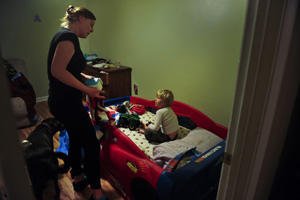
As the days passed, Aaron made it a priority to reconnect with his wife and children. Often, lost amid the redeployment shuffle are the enormous sacrifices that were made by family members left at home. There are no medals of valor for toddlers who help watch their baby brother, or Purple Hearts for the scraps and bruises from learning how to ride a bike without training wheels.
"I had to tread lightly right off the bat," Aaron said. "Ayden was still sensitive, so I had to ease back into his life. Now that (the weather has) gotten nice, I've been able to take Ayden fishing. It's something I haven't been able to with him; he didn't really want to do that last year.
"Everett, he's easier, all you have to do is pick him up a few times and start building that bond with him," he said. "Me and Heather, we really haven't figured it out 100 percent yet. We're getting there, and we're getting along great. The home life is great, but you can't rush it."
Most Airmen would likely agree that raising a family in the military is a challenging way of life. But every day, all around the world, military families pull together to make life work.
"No one experience is the same," Heather said. "Any one person can have a different dynamic in their relationship or different circumstances at home. Similar to mine, I would want someone to know, to not be afraid or ashamed to ask your friends for help. Try not to take on extra things while your spouse is gone and overburden yourself."
